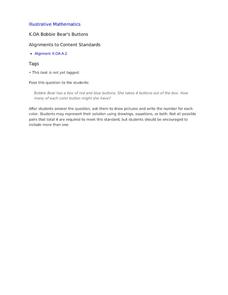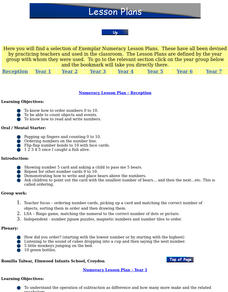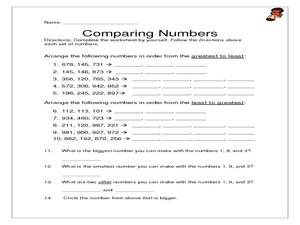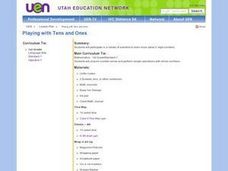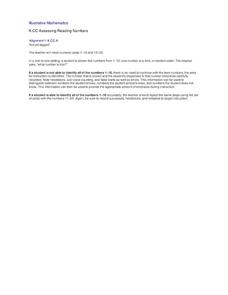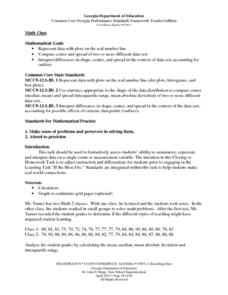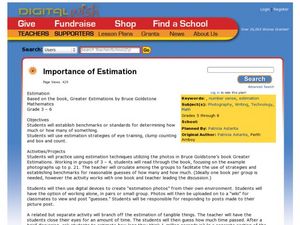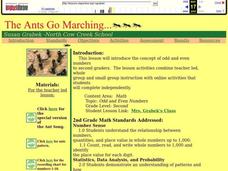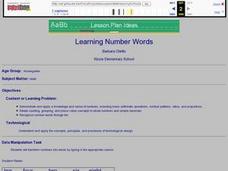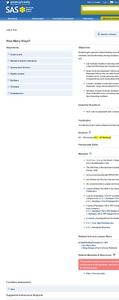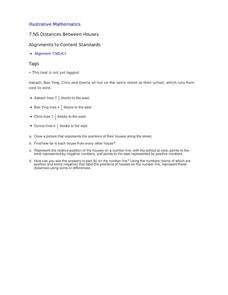Illustrative Mathematics
A Bobbie Bear's Buttons
Young mathematicians help Bobbie Bear pick colored buttons out of a box as they learn how to decompose numbers less than 10 into pairs of smaller numbers. To support learners with the process, consider creating a worksheet or graphic...
Curated OER
Numeracy Lesson Plan: Reception
Students examine number sense by participating in identification activities. In this number value instructional activity, students practice counting from 1-10, identifying number flash cards, reading clocks and multiplying basic numbers....
Curated OER
Calendar Counting
Students demonstrate how to count by 2's. In this number sense lesson, students review skip counting on the hundreds chart and recognize the pattern of counting by 2's. Students use a reproducible of a calendar to color in the days as...
Curated OER
Arranging Numbers in order up to 1,000
Third graders arrange numbers up to 1,000. In this arranging numbers instructional activity, 3rd graders play a game to try and build the biggest number they can using number tiles. Students work in groups to draw number tiles from...
Curated OER
Playing with Tens and Ones
First graders complete a number of activities that increase their number sense and use of simple operations. They use dice and worksheets to make two-digit numbers and to record them, they count by tens and ones, and order numbers using...
Curated OER
Is Your Order Up or Down?
Students practice ordering numbers. In this number sense lesson, students collaborate to order whole numbers from greatest to least and least to greatest. Students also practice the concept by using educational software.
Curated OER
Counting and Math Concepts
Students practice counting to the number three. In this number sense instructional activity, students practice counting to the number three by using various objects. Students arrange and count the objects.
August House
The Stolen Smell
Some smells are better than others! Explore your sense of smell with a series of activities based on the Peruvian folktale, The Stolen Smell. With exercises about phonics, counting, cooking, art, and drama, the lesson is a...
Illustrative Mathematics
Assessing Reading Numbers
Youngsters develop their number sense by rote counting from one to ten. Over time, they identify the numbers on their own and no longer rely on fixed recitation. Using numerical flashcards, a teacher will randomly choose numbers from the...
Illustrative Mathematics
Making a Clock
Have a fun time teaching children to read analog clocks with this whole-group math activity. Using large sets of the numerals 1-12 and 0, 5, 10...55, the teacher creates a large clock on either the carpet or the white board, explaining...
Georgia Department of Education
Math Class
Young analysts use real (provided) data from a class's test scores to practice using statistical tools. Not only do learners calculate measures of center and spread (including mean, median, deviation, and IQ range), but...
Curated OER
Importance of Estimation
Students discover the ability to estimate based on viewing photographs of objects. In this number sense lesson, students view photographs of numerous objects in which they must train their eyes to create an educated guess of how...
Curated OER
Odd and Even
Explore the concept of odd and even with your class using this resource. Learners take an online test demonstrating their knowledge of odd and even, sing a song about the concept, and engage in computer-based activities.
Curated OER
Learning Number Words
Students practice saying their numbers and identifying the words. They use whole numbers and decimals to practice grouping numbers into different categories. They write the word of the number they are shown.
Curated OER
Zero Is Our Hero
Students engage in a instructional activity that is concerned with the mastery of counting by ten's. They practice counting to varying quantities not to exceed 100. Students could also use manipulatives that are separated into groups of...
Curated OER
How Many Ways?
Second graders develop number sense. In this number sense lesson, 2nd graders use multiple ways to represent numbers including written numerals, tally marks and manipulatives. Students correctly use place value to the thousands place.
Primary Junction
Adding Tens
Build on your learners' confidence in quick addition as they discover strategies to add tens to two-digit numbers. After reviewing counting by 10's, they discuss tactics to add multiples of 10 to other numbers. They visualize how to...
EngageNY
Percent of a Quantity
Visualize methods of finding percents. Classmates find a percent of a quantity using two methods including a visual model in the 26th lesson in a series of 29. By the end of the lesson, scholars find percents given a part and the whole...
Curated OER
Counting Chart
Elementary learners discover counting through a counting chart. In this math lesson, students identify numbers 1-100. They then point or recite their counting numbers.
Curated OER
Divisibility Rules Using Scientific Calculators
Young learners apply divisibility rules to determine if a number is a factor of another number. They discuss what numbers are factors of another number and identify patterns using divisibility rules.
Curated OER
Measuring our Hands!
How do we compare? Get your scholars measuring using this interactive and kinesthetic math activity. First, learners compare something (you announce- could be index finger, palm, feet, etc.) to classmates. Consider having them record...
Curated OER
Operation Spaghetti
Find the math in recipes. Young chefs will follow a recipe and investigate the total cost for materials. They measure amounts of food necessary for the recipe and compute the per person cost.
Curated OER
Distances Between Houses
This resource sneaks in the math so your learners will be adding and subtracting positive and negatives on a number line while thinking they are mapping out houses. The activity starts by putting houses the appropriate distance away from...
Curated OER
Counting Blood Cells
Students observe number sense by participating in an estimation activity. In this blood cells activity, students identify the importance of blood cells in the human body and discuss how tiny they are. Students utilize paper dots as a...
